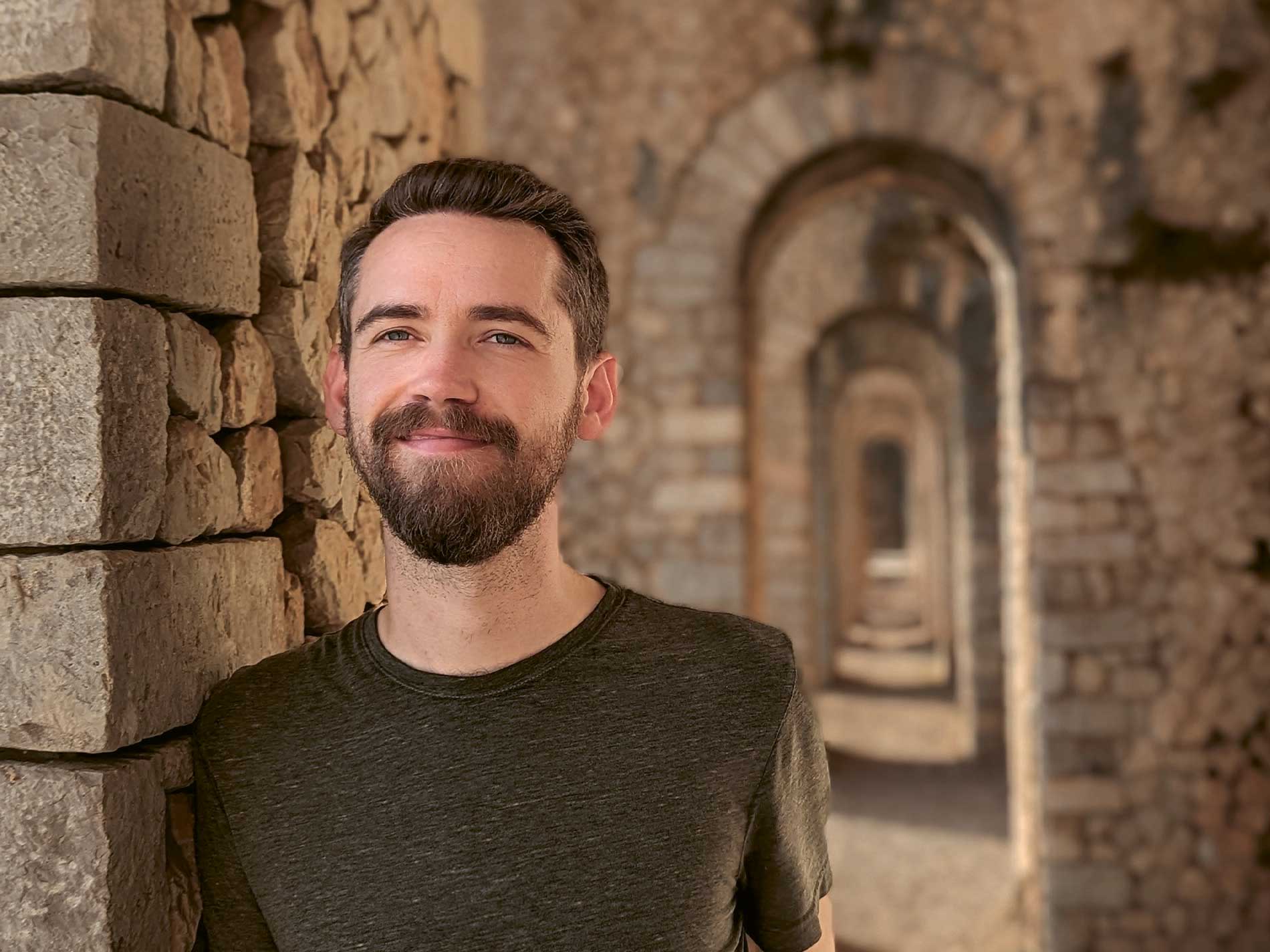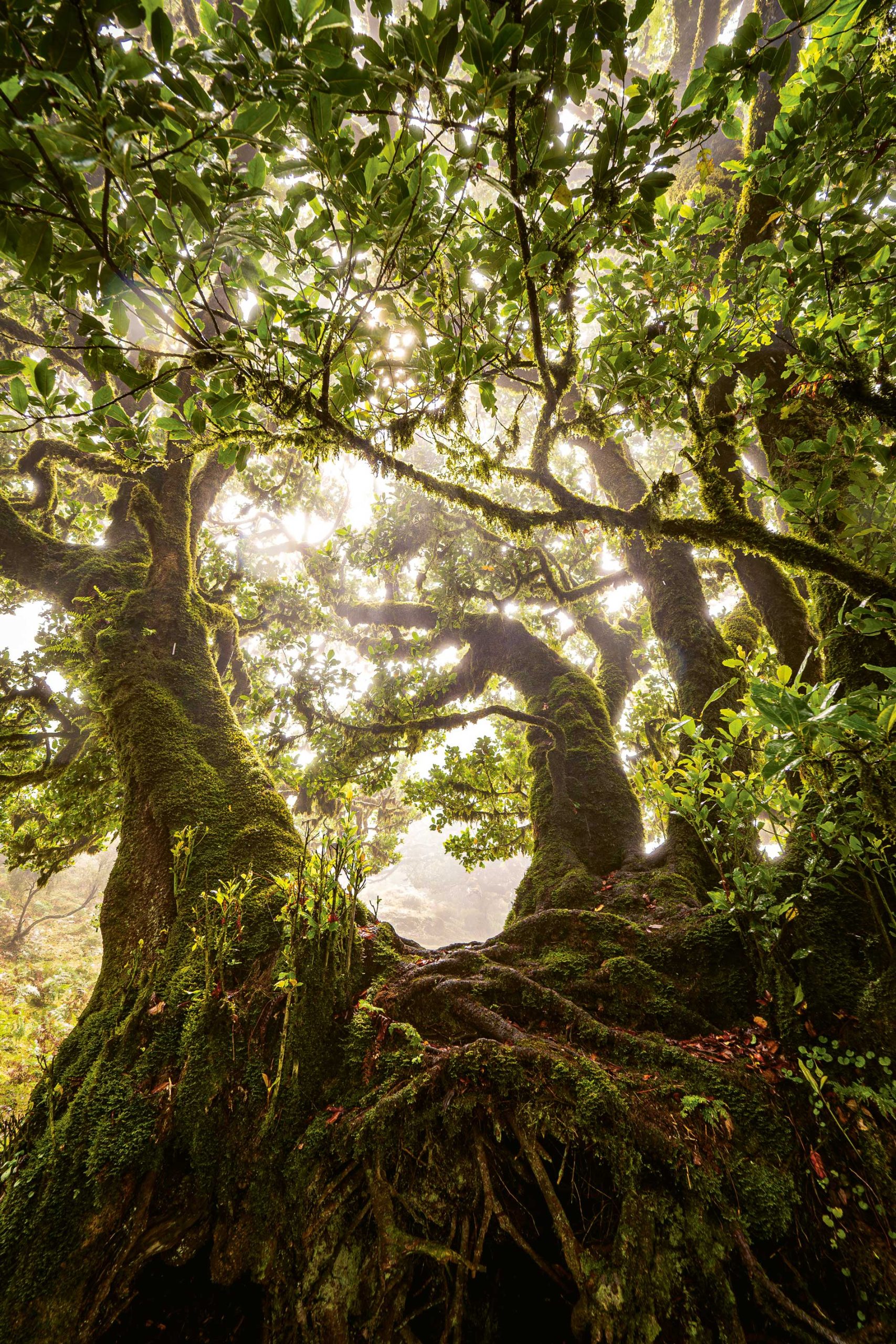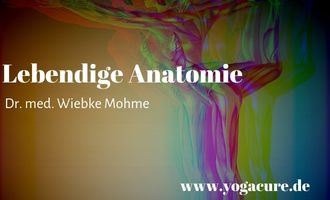Erik Jampa Andersson has recently published his first book, Unseen Beings, in which he impressively points out how recognising and truly appreciating the more-than-human-world with all its miraculous sentient beings in their personhood can profoundly heal us – and is the only way to really address the climate crisis and our nowadays multifaceted dilemma which is deeply rooted in our narrowly human-centered approach to life. In this interview, he gives precious insights on some of the major aspects discussed in the book.
INTERVIEW
YOGA AKTUELL: First of all, let’s briefly outline to whom you are referring in the title of your book. As you mention in the introduction, one might assume it speaks of entities like ghosts or angels while it is actually mainly physical beings which are – for reasons that we are going to discuss in a moment – denoted as unseen here.
Erik Jampa Andersson: When I set out to write it, I was thinking that I was going to be talking about nature spirits as they are really the central focus of my academic research, and a big part of my spiritual identity. I’m very interested in them as a concept, and the book kind of is about them. But like you said, “unseen beings” can refer to a wide array of beings who are unseen not because they are invisible (many of them are not at all invisible!), but as a function of our disregard. We have chosen not to see them as ‘beings’. And this can apply to many different kinds of beings. It can apply to humans, and it certainly applies to a massive number of animals that we actively unsee. But I think plants are perhaps the most obvious example of this. There’s a phenomenon called ‘plant blindness’, which is a tendency to not even notice the presence of plants, or at least not to recognise their presence as individuals. We just think of them as nice scenery – a backdrop, something pretty to look at. But we don’t really think of them as individual entities, even though they are literally our cousins. We are, each of us, genetically related to every single plant in the world. They are our cousins, just like every other human, every animal, and even the bacteria in your gut. So Unseen Beings is really about all of them.

But I do think talking about spirits is important, because spirit paradigms break us out of this biologically-centred idea where we think that one organism = one being. Even if we’re very progressive in our approach to biological entities, we still have this tendency to think that one plant is one being and that’s the end of the story. But spirit paradigms, especially nature spirit paradigms, allow us to expand beyond this – for instance, thinking in terms of ecosystems, landmasses, and entire locations. A tree is certainly a being, but so is a forest. They may be composed of many other beings – plants, fungi, microbes, animals, waterways, and maybe some humans. But a forest is also a being in and of itself, and that’s something that I think is most easily negotiated through nature spirit paradigms. It’s a lot easier to think of a forest, mountain, or lake as a being if we can represent them in a relatable way through this sort of paradigm.
Parts of humanity – not indigenous cultures, but certainly the modern societies – have lost their holistic understanding of and their curiosity for other species as inherently precious beings who have a right to live which is not at all defined by their utility for humankind – and that’s why you call them unseen beings.
Before we proceed to the consequences of our blindness to that vast web of creation, could you explain what it is that we do not see?
We don’t recognise their personhood, we don’t recognise their agency. Within every one of these beings is an experience of beingness. Obviously, philosophical traditions like Buddhism argue quite a bit about whether or not there is a real ‘experiencer’ or some kind of ‘self’ at their core – but the same can be said for all of us. But the real point is that there is a whole world of sensory experience – there’s thought, there’s perception, there’s decision making, there’s agency. Each of us is an agent in the world – we’re interacting with each other in this giant and diverse web of awareness, and it’s through those interactions and intersections that our world comes into being.
We tend to think that the world is our stage – we humans are the actors, animals are props, and plants are our set pieces. That is how we perceive reality. We fail to recognise that nobody is just an object. Our non-human kin are not inert ‘things’ reducible to their utility. Even plants have multi-sensory perception. Both modern science and traditional knowledge demonstrates that they can see, hear, smell, taste, and touch. They can learn, they can remember, they can communicate, and they can form relationships. But we miss that entirely when we only relate to them as objects, or as beautiful things, or as even tools. You know, coming from a traditional medicine background, I was trained to think of plants as valuable healing substances. But even when we think of them only in those terms, that’s still a kind of instrumentalism – perceiving their instrumental use as the core of what or who they really are. And that robs us of the ability to understand the world and our massive ‘hyperobject’ of environmental and climatic crises.
We can’t deal with the environmental crisis in an honest way if we refuse to acknowledge that it’s not just impacting humans. It’s not just about our future or our welfare or our survival. It’s about learning to live together, learning to form more-than-human societies and collectives that allow us all to flourish – that allow us all to live well.
Another crucial question is why we have become that blind – though this is not easy to put in a nutshell as it goes back to Aristotle, to religious dogmata and to various other influences, could you give a few hints on that?
I mean, as you said earlier, it’s important for us to always bear in mind that the dominant modernist world that most of us live in is not the only story. It’s not the only world that exists, even today, and folks that are interested in climate justice and environmentalism should really let that sink in. ‘Humanity’ itself cannot be the problem, because ‘humanity’ isn’t some singular undifferentiated whole. It’s specific human societies – specific institutions and human projects – that have primarily perpetuated these anthropocentric and instrumentalist approaches to life. There have always been alternatives. Looking at the history of our species and all of the different societies and cultures that have existed within it, the vast majority of them have not shared our modern instrumentalist worldview. The vast majority understood deeply that non-human animals, plants, fungi, spirits, etc. are beings as well, and that they’re actually quite similar to us in a lot of fundamental ways. There is a continuity of being that underlies all our experiences. So I think it’s always important to say that, because then the solution to climate change isn’t to simply do away with humans. Lots of folks say, “Oh, humanity needs to be wiped off the planet. We need less humans. We’re overpopulated.” But that doesn’t actually make any sense, because it’s not all humans. It’s specific human societies. This actually makes finding solutions a bit easier, because we can better identify the true root causes. We can see where the problem comes from, specifically, and we can treat it at the root instead of bypassing into this anti-human idea.
In the book I deal a lot with the history of European civilisations, including the ‘Neo-Europes’ that popped up around the world through colonisation, because that’s really an important root of the problem. And that isn’t to say that all European societies throughout history have been some terrible thing. Obviously, that’s not true. But there have been threads of philosophical and cosmological thought running through certain European cultures that were used as the foundation for globalisation, colonisation and global conquest. And there are specific points in history we can identify as making the most significant contributions to this process. The classical Greco-Roman era is one of them, when thinkers like Plato and Aristotle formalised the idea that humans alone are sentient agents with a ‘Rational Human Soul’. Ultimately, ideas like these were intermixed with religious movements, theology, dogma, and systems of vertical morality. Anthropocentrism as we know it really came out of this – this idea that we humans are the most important creatures that have ever existed, and that the world ultimately revolves around us. Of course, it’s important to note that Aristotle and Plato didn’t think that they were correctly describing the absolute truth about reality in their work. That’s not what philosophy is about. Philosophy is the love of wisdom – the endless pursuit of wisdom – not pretending that you have everything figured out. It’s a process of experimentation in different ways of thinking. Philosophy is a living, breathing system of inquiry – it’s a way of experimenting with what it means to be alive and what it means to live a life worth living.
But remaining with the unknown is difficult for a lot of people, and a lot of later cultural and religious movements transformed ideas like these into doctrinal truths. Christianity played a big part in this, both in Europe and eventually across the world. Christianity has been described as the most anthropocentric religion ever created – and of course, the idea of ‘master identities’ and a hierarchy of beings becomes easier to imagine when you have one sovereign, one ruler, one truth, one God, one system of morals. That mentality is phenomenally powerful. It destroys any form of pluralism, any diversity of views and ways of living. But we can’t collapse everyone into one mould. We need to embrace the plurality of what it means to be human in a more-than-human world.
I also talk about Descartes in the book, since he was really the gateway between these ideas and the modern world. He was very much inspired by classical philosophy and conservative Christian theology, as well as by modernist ideas about mathematics and science. He is considered to be the father of modern philosophy, but he was also a pretty terrible person by all accounts. He did horrible things, and had really deluded ideas about the nature of the world and this fundamental existential gap between humanity and the ‘natural’ world of biological machines. Even after a few hundred years, when we have evolved past these ideas scientifically, a lot of people still cling to this divide. There is a shocking number of people that really believe that non-human animals generally don’t have any kind of inner life. They don’t feel pain, they don’t have emotions, they don’t experience suffering or love. People think that they’re somehow complete separate from us, just unconscious machines walking around for us to kill for their food and fur. That’s not a scientific idea – it’s a story – a rather convenient one if we don’t want to worry ourselves about the ethics of our behaviour. Descartes’ legacy looms large over the world that we live in right now, and our current environmental crisis.
Our anthropocentric approach to life has brought us to the edge of our own extinction. While some aspects of this causal connection may be quite obvious to most people by now, there are also aspects many of us are still not aware of. Could you sum up some of these links between our callous and often ignorant view of our co-creatures and our current multiple crises?
I think it’s the very core of the problem. We have a terribly difficult time framing our crisis in terms that don’t centre around the human. When politicians talk about the climate crisis, we hear them talk about the future of humanity, leaving a clean and abundant world for our descendants. We talk about the sustainability of resources – we don’t want to run out of ‘resources’. These are the primary concerns that take centre stage in conversations about the environment, which causes us to focus on very specific things like energy procurement. Of course, this is truly very important. We absolutely need to divest from fossil fuels. We need cleaner and more sustainable sources of energy. But that itself is not going to fix the problem. It was there long before the internal combustion engine – long before we started making plastics and microplastics and so on. This problem has been brewing for thousands of years, arising from a tendency to view ourselves at the centre of everything, and reducing everyone else to a resource that we can freely exploit at our own discretion. In that view, the only limitation is running out of resources. We don’t see exploitation as a problem, only unsustainable exploitation.
This is why I cringe when I hear people talking about ‘sustainability’. We need to have a less destructive impact on the environment, but framing it as an issue of sustainability really ignores the elephant in the room, which is: ‘What are we trying to sustain?’ When you get down to it, what we want to sustain is exploitation. The ‘solution’ that so many of our politicians and big thinkers are dedicated to is, ‘How can we make our systems of exploitation more sustainable so that we don’t run out of resources?’ But that’s not the root problem. The root problem is that our systems are built upon the suffering of others. Making that system last a bit longer doesn’t make it less horrendous. It just makes the suffering last longer. So I think we’re really missing the primary problem.
This view also causes us to think about climate disaster as a pending future possibility – something that will happen if we don’t change things quickly. But there are already consequences – horrible ones – and there have been for at least hundreds of years, affecting both human and non-human beings. After all, we are in the middle of the sixth mass extinction on this planet, specifically orchestrated by our own exploitative practises. We think that apocalypse is something that might happen in the future if we don’t change course, but there have already been a billion apocalypses, particularly for black, brown and indigenous people around the world. This isn’t a brand-new issue that started in the past fifty or even the past 200 years. This has been a long, slow burning, chronic disease that’s existed for a very long time. I think a shift in perspective is really important.
For example, it’s very common to hear people say, oh, we need to protect the Amazon because it’s the ‘lungs of the earth’. And that’s not actually true, first of all – that’s not where most of our oxygen comes from. But this is what we think. We think that the air we humans breathe comes from trees, and that this is the reason we should protect the Amazon. We don’t think about the fact that the Amazon is a massive ecosystem of billions and billions of forms of life, all of whom are alive, all of whom can experience suffering, all of whom have needs and desires. We don’t really care about them. What we care about are resources, sustainability, and human flourishing. How can we really address the horrors of mass extinction if all we care about is human extinction? In order for us to deal with the climate crisis meaningfully and earnestly, we have to reframe what the problem actually is. And we need to be able to see the history of it a little bit more clearly.
Despite our own history comprising the animist perception we once had as well as many insights of modern science clearly pointing to the fact that all beings on this planet are indeed sentient, it seems hard to free ourselves from the anthropocentric paradigm and re-align our perspective. How can the revolutionary power of myth (as you call it in the book) help us with this task?
We are a storytelling species, and stories are the ‘operating system’ through which we experience reality. We don’t experience naked reality as-it-is. We’re not machines. We don’t just process data and act accordingly. We filter our experience through the medium of story to make it perceptible and relatable. It allows reality to be something that we can actually engage with, that we can invest with meaning. So the stories that we tell have a lot of power, and they are not only impacting our lives as humans – they also impact the lives of others. The stories that we tell ourselves massively impact the lives of cows and chickens and pigs and dogs and cats and horses and birds. So we have to harness the power of story. Stories can lead us to a brighter future, but they can also lead us into utter and absolute destruction.
A unique capacity of myth, specifically, or even of mythopoeic fantasy, is to illuminate the stories of the non-human. Ursula K. Le Guin once said, “What fantasy can do that the realistic novel generally cannot do is include the non-human as essential.” That’s really important for us to understand, because a lot of the stories in the 21st century are stories about what it means to be human – focusing on our human emotions, politics, dramas, and relationships. But fantastical storytelling breaks that open, allowing us to make sense of the experiences of non-human beings, whether they’re animals, plants, environments, extra-terrestrials, ghosts, nature spirits, gods, or ‘demons’. Anyone can be a part of these stories. And this is what makes them so potent. You can have stories about how trees feel about being chopped down, or the perspective of a forest. It’s hard to imagine those kinds of stories in our conventional systems of storytelling, but in ancient times that was very easy to do, because they regularly tapped into this mythic mode of experience.
Fantasy also provides us with a kind of ‘sandbox’ for experimenting with different ways of living, different social structures, different cosmologies, different constructs of what it means to be human in a more-than-human world. It’s like science fiction in this way, which is also very important in the modern world. As we stand at the threshold of an AI-dominated world where machines are taking on a massive amount of responsibility and decision-making, it’s important that we think about what our future worlds might look like, and the best artistic medium for that to happen is science fiction. We can tell stories, write books, and make movies that deal with those ethical quandaries directly, investigating the complex interpersonal dynamics and deep emotional questions that arise out of these developments. So I think science fiction is very useful, but I think fantasy and myth are even more useful for grappling with the specifically more-than-human-dynamics at play: for experimenting with different ways of living with animals, plants, spirits, locations and ecosystems, and indeed with the planet itself.
Of course, the power of stories goes in both directions. We’ve used stories in horrible ways, to highly detrimental ends. Stories have caused a massive amount of death and destruction. Look at the world today, look at the wars that are being waged today. These are largely ideological wars, or at least that’s how their negotiated in the public sphere. They centre around stories about what a nation is, who belongs in certain places, who owns what, who has rights to dominate. These are stories. We have to be very careful of them in that regard. But good stories can do exactly the opposite – they can take us out of those dark places, out of this dumpster fire that we’ve created, and into a more positive future. And perhaps most importantly, they give us the space to imagine new possibilities. Our future hasn’t yet been written. We’re constantly writing and rewriting it as we go along. There’s no fixed destiny that we absolutely can’t avoid. So stories give us the opportunity to imagine a new future, which is really the first step in creating it.
And I think there’s also the aspect of enchantment or re-enchantment which is so important about stories, because through that, they bring relationship into our lives – a crucial element to experience ourselves as part of nature again and to see more-than-human-beings as the persons they are.
Absolutely. Enchantment is a fundamentally relational experience. We are enchanted by others. Enchantment is the spark that arises at the meeting of minds. We can experience it when we look into the eyes of a lover, when there’s such true intimacy that you really see the other person behind those eyes – another human being with a whole universe of experience. That is a spark of enchantment, and a profoundly embodied one. It makes us feel alive, and allows us to truly sink into our animal nature and our human nature, which are not different things. You can be enchanted through an experience with an animal, with a pet. My relationship with my childhood dog, to whom Unseen Beings is dedicated, was a really formative experience of enchantment for me. But art is also a potent source of enchantment for many people, myself included. I talk in the book about reading the works of J.R.R. Tolkien. They really transformed my experience of the world, plunging me into the seas of natural enchantment. It was through his work that I first experienced what it means to have altruism, to radically care for others. But I think what inspired me most was his approach to the natural world. Tolkien says explicitly his work is not anthropocentric at all – if anything, it’s elf-centric! It revolves around the experiences of beings who are, in his own words, “far more natural” than we humans are – more closely interwoven with the natural forces of our planet. He was, much like our forebears, largely interested in the ennoblement of ‘simple’ things, like animals, plants, trees, flowers, mountains, rivers, the sea, and the Sun and Moon. He brings them out of the background and into the fore, as characters in the story. On any page of The Lord of the Rings or The Silmarillion, in indeed in any of his many works, you’ll find countless references to individual plants, to individual landscapes. He lets their voices be heard. I think that approach to storytelling can be profoundly impactful in augmenting the ways we approach the living world.
In one of his greatest essays, ‘On Fairy-Stories’, he explains that tales like these have three primary functions. They allow us to escape from the ontological shackles of instrumentalism and this human-dominated world devoid of magic – which isn’t the true world! We’re not escaping from reality, but into reality, like a prisoner breaking free. Such stories also facilitate recovery – of health, a clear view of the world, and a sense of what it means to be human in a more-than-human world. Through this, they also provide consolation. Stories like these give us a glimpse of a happy ending – what he calls a ‘eucatastrophe’ or ‘good catastrophe’ – the opposite of the terrible apocalyptic catastrophe. We need that now more than ever.
I believe we need to take recovery as our goal. It’s not about ‘saving the world’ like some superhero swooping in with our supreme intellect and technology. That story is just another version of our quest for dominion. We don’t need to double down on control – we need to take a good hard look at ourselves, to recover our own humanity. We need to heal our own hearts and souls. Because for a very long time, we have completely alienated ourselves from absolutely everyone else. We’re even alienated from ourselves – from our animal bodies – from our vital entanglement with all of these different forms of beings on our planet. We need to heal from that trauma. It makes us miserable. I don’t think it’s any surprise that we experience ‘deaths of despair’ more than ever before. In the (supposedly) most advanced, prosperous, and progressive time in human history, people are still miserable. We still suffer immensely, and force others to suffer because of our own trauma. We’re in a dark place, and I think it’s really because of this fundamental sense of alienation from the living world. We need to remind ourselves that dominion is not necessary, nor is it a noble or healthy approach to life. In making this shift, we might find that a less oppressive approach to life is precisely what we need to find true satisfaction and fulfilment. You know, people think that fixing the environmental crisis will mean that everyone has to be miserable. That’s not true. We’ll find very quickly that living in harmony, in accord with the other-than-human world, is going to make us happier. It’s going to give our lives more meaning. It’s going to allow us to live lives that are really worth living.
It would revivify our very souls – but even the spiritual disciplines that are talking about the soul and about union or oneness so much seem to miss this point.
Coming from a Tibetan Buddhist background, for 20 years I’ve been fortunate to have this whole other lens through which to experience the world, and that was an incredibly valuable experience. But I do find that in a lot of these kinds of ‘spiritual’ environments, there is indeed an unconscious tendency to still conform to modernist assumptions about reality even while wearing the garb of alternative lifeways. I think that this is really a big risk. Folks are drawn to meditation, yoga, and esoteric disciplines because they want to attain liberation – to transcend being human and get to this more mystical dimension of existence that we think of as being wholly separate from the Earth. Many religious systems, including Indian traditions, operate based on the assumption that the conventional world in which we live is suffused with suffering – this is samsara – and the goal of spiritual practise is to transcend it. This is very attractive to many modern people, which I think is quite concerning. We want to master our minds and transcend our human experience, but we’re not usually as interested in what these wisdom traditions might teach us about our relationships and entanglements in this more-than-human world. It’s important that we don’t lose sight of those other features of these traditions. It’s important that we don’t become solipsistic in our approach to spirituality, and focus solely on what it means to be human. This is one of the reasons I am so interested in the animistic dimensions of traditional spirituality.
These traditions have thousands of years of history – of negotiating our existence in a complex, living world. This is what many ‘nature spirit’ paradigms arise from. But all-too frequently, people toss these things out as ‘cultural ideas’ and superstitions – as secondary to the main point, which is transcendence and liberation. I think this actually needs to be flipped on its head in the 21st century. I think it’s more important now than ever that we focus on our relationships with non-human beings and our environment. And these systems do offer a great deal of wisdom and knowledge for working towards that. We just have to listen to them and take them seriously. We need to recognise that there is no reason for us to cling to anthropocentrism and world-denying philosophies. So I hope that people feel inspired to really take those elements of our global traditions seriously: to listen to what their wisdom holders have to say about the intimate and diverse relationships we have with non-human beings. It’s going to be an incredibly grim future on this planet if we fail to take this opportunity to change our ways of living and seeing the world.
This observation seems very accurate to me – way too often, the focus is on how to get yourself out of it all by transcending the world or on everybody’s own personal wellbeing only.
Yes, exactly – and this is really no different from what everyone else is doing. It’s no different from what Western societies have been doing for hundreds of years, if not thousands of years. We are no strangers to transcendent theologies and philosophies. Of course, we’ve moved away from dogmatic religiosity to a certain extent in the West – although there’s a troubling resurgence of it, in the worst forms, in places like America. But by and large, we’ve moved away from the single male God that we all have to worship or otherwise he smites us and sends us to hell. But we’ve largely just transitioned to worshipping ourselves. We worship the divine human. Humanism is a great idea in certain ways, but it’s very dangerous in other ways because we’re not in a strictly human world. We are in a more-than-human world. We are just one of countless species on this planet and we all need to live in collaboration and cooperation with one another. We need to recognise the beingness of those other beings if we want to have a healthy and balanced society. But I do find that a lot of alternative spiritual movements are still missing the point. We’re still falling into the same tired patterns that got us into this situation in the first place. We need to get a bit less obsessed with ourselves and start taking our responsibilities seriously, and to critically analyse our relationship with our planet.
Indeed! Thank you so much for the interview!
More information:
www.erikjampa.com
www.shrimala.com
www.unseen-beings.com

 Yoga Aktuell 122 - 03/2020
Yoga Aktuell 122 - 03/2020 







